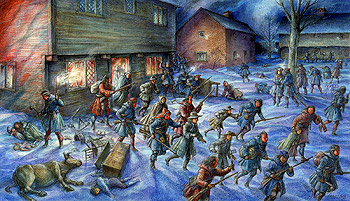|
Subject Areas
• U.S. History - Colonial America and the New Nation
Level
Upper elementary through high school
Learning Objectives
After completing these activities, students will be able to:
• Explain why the numbers do not agree on numbers killed, etc.
• Express opinions about why some sources are more reliable than others
• List the important points brought up in the writings
Skills
• Primary document analysis
• Interpreting written information
• Comparing and contrasting
• Making inferences
• Thinking critically
• Expressing opinions
Time Required
Two to three class periods
|
Introduction
In this lesson, students learn that historical references are not always accurate in their presentation of historical information.
Guiding Questions
Why don't reports over time agree about the numbers of people killed, captured, etc. in regard to the 1704 attack? Does it matter? Why or why not?

Preparing to Teach
Note: If students do not have access to computers in class, this lesson cannot be used as a group exercise.
- Go to the Story
Menu on the 1704 website and click Attack
on Deerfield. Read the Overview
tab.
- Go to the American Centuries website (www.americancenturies.mass.edu)
to access the curriculum titled: The
Lessons of 1704 - Lesson #6, 1704 Attack on Deerfield.
Click and print the excerpts in Readings for Activity
3: Outcomes of the Attack. Then click and print
the Statistics Worksheet for 1704 Attack on Deerfield.
Teaching the Lesson
- Instruct students to go the Story
Menu of the 1704 website, click Attack
on Deerfield, and read the Overview
tab.
- Divide students into groups and distribute a different
selection of excerpts to each group. Also make sure each
group has copies of the Statistics Worksheet for
the 1704 Attack on Deerfield - one for each excerpt.
- Instruct each group to complete the Statistics
Student Activity Sheet based on their excerpts.
- Ask students to review the worksheet and discuss in their
groups, the possible reasons for discrepancies among the
sources.
- Chart students' findings on the board and then ask:
a. What might explain why these numbers don't agree?
b. Why do we know less about the numbers of Native Americans who were killed? Why are the French more likely to be documented?
c. Which sources are you most likely to believe? Why?
d. What are some of the most important points brought up in these writings? Should these statistics be included in those important points? Why or why not?
e. What conclusions can you draw from this exercise?
Suggested answers to the questions above.
From the Explanations Menu on the 1704 website:
- Who owns History, by Barry O'Connell
Captors and Captives, by Evan Haefeli and Kevin Sweeney
This lesson was adapted from one by Charlene Galenski and Kathy Klaes, teachers at Deerfield Elementary School in Deerfield, MA.
|
![]()
![]()